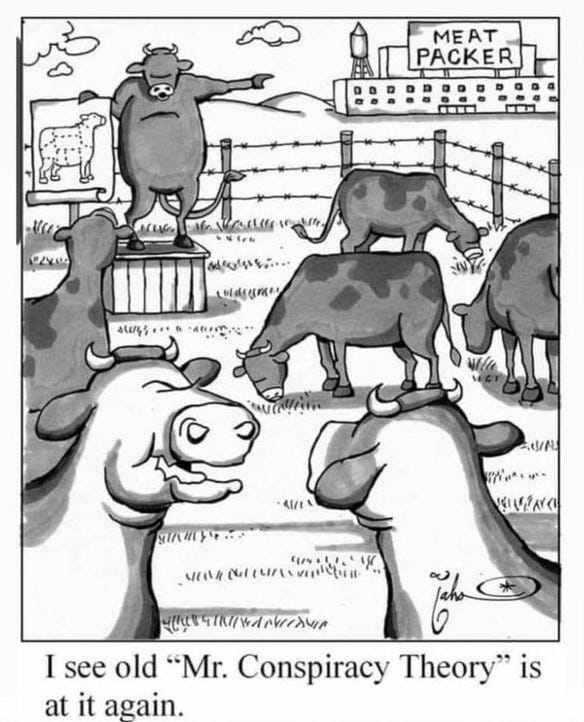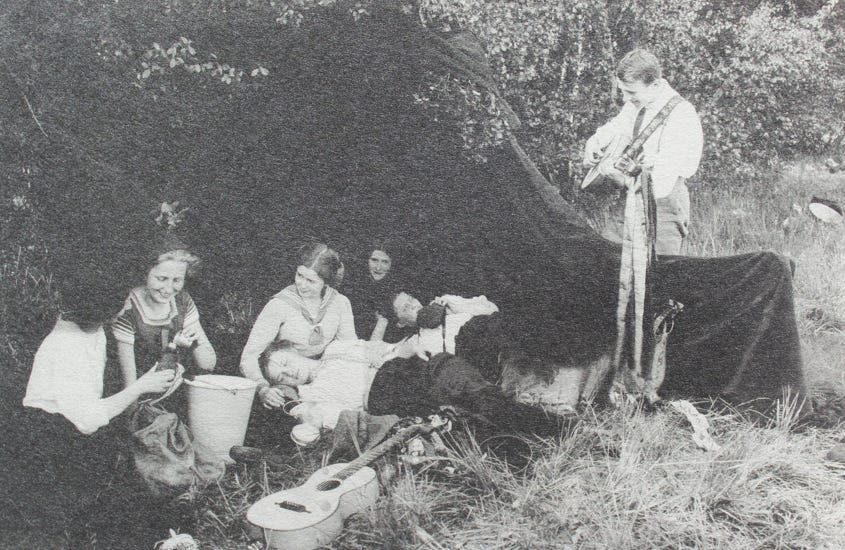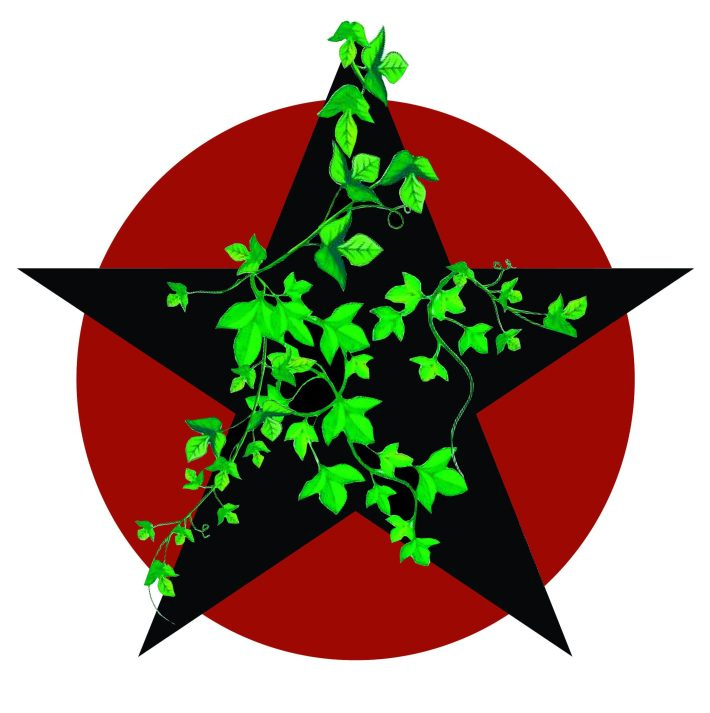Click here for Exit the Cuckoo's Nest's posting standards and aims.
SYSTEM? WHAT SYSTEM?
by Paul Cudenec
The other day, while out spreading the word in the streets, one of my friends handed some of our dissident literature to a passer-by with the explanation that we were countering the lies of the system.
Although the man in question turned out to be warmly sympathetic to our cause, this remark really stumped him.
“The system?” he asked, with an expression of utter bewilderment clouding his face. “What system?”
Although this may have merely been a case of unfamiliarity with a certain terminology, I like to think that his response revealed the greatest triumph of the odious entity that now controls nearly the whole world and is currently trying to impose its Great Reset on us – it has managed to wrap itself in a cloak of invisibility!
This is not even a question of who exactly is behind all this (though there are some useful pointers here, here, here and here): the root problem is that most people do not even realise that the system exists.
For them, we live in a pluralistic world. Within the framework of something known as democracy, they picture a complex interchange of competing forces and interests resolving themselves in a status quo which we are more or less obliged to go along with.
While this misunderstanding is perhaps forgivable for those whose information comes straight from the corporate mainstream, it is also shared by those who give the impression of knowing better.
I have spoken to self-defined “anti-capitalists” whose view of “capitalism” seems very similar to that of the ruling group they claim to oppose: they see it as an agglomeration of social and economic relationships without any overriding direction or control.
To suggest otherwise, in their eyes, is to commit the grave heresy of spreading conspiracy theory.

Their imagined reality of various independent capitalists struggling against one another in a dog-eat-dog world of rugged competition – and thus being incapable of ganging together to cheat and enslave the rest of us – seems to have survived intact since the mid-1800s, when Karl Marx was formulating his theories.
Anyone paying attention today cannot have failed to have noticed the way that multinational businesses and financial interests have converged to the point that their ownership can be traced back to a handful of concerns like BlackRock, Vanguard and State Street – which themselves appear to be part of the same overall operation.
This same corporate/financial über-entity has also become heavily entwined with – and indeed essentially inseparable from – state bodies and international institutions.
The resulting monster is a self-concealing global public-private governance pulling the strings behind all aspects of our contemporary world.
Once you have seen past the cloak of invisibility and understood that there is such a thing as the system, everything else begins to make sense.
For instance, I have long despaired over the absence of an authentic philosophy or movement of resistance. All the existing off-the-peg options fall well short of what we need and even lead people in completely the wrong direction.
Why is this? Is it entirely due to the failings of the system’s opponents? Is it because the arguments of those defending the system are so strong and appealing that it is not possible to express coherent disagreement?
Or is it rather that, as part of its self-advancement, the system has deliberately set out to ensure that there is no credible criticism of its Great Racket?
It would have to, wouldn’t it, if it wanted to remain invisible?
Its big lie – or Great Narrative if you prefer – has always been that the vile world it has manufactured is inevitable, part of the necessary evolution of human history.
It projects the assumption that this “progress” towards modernity is somehow tied in with the passage of time itself. Two thousand and twenty-two years after the birth of Jesus Christ, it was always going to be the case that humankind lived in a world of airports, chemical factories, server farms and nuclear power stations.
This is just the way things are. It just happened like that. There is nothing anyone can do about it. You can’t turn the clock back.
This story is, of course, not true! There are lots of ways in which the present could have shaped up. There was nothing inevitable about the industrial revolution, for a start, as mentioned in this article.
But it is crucial for the system that we believe this fairy tale of spontaneously self-creating modernity. Because, if we don’t, it means that we realise that somebody created it with a specific purpose in mind, namely profit and control.

And, at that point, the system ceases to be invisible, ceases to appear random, and reveals itself to be a deliberate act of theft and enslavement – for which specific groups of people are historically responsible.
In order to defend itself from people’s awareness of what it has done and is still doing, with all the outrage and rejection that this would rightly spark, the system therefore has to destroy any opposition that calls attention to the fact that its world is not inevitable and which insists that a completely different way of living is both possible and desirable.
One of its favourite tricks, over the centuries, has been to infiltrate and take over a resistance movement, use it for its own ends, wipe out the genuinely radical elements and then use the excesses and crimes committed by its own fake-revolutionary placemen to discredit the whole idea of revolt against its slave-system.
“See! Look what happens when you rebel against our world!” it tells us later.
Thereafter, any dissident voices that seem to be connected to the fake-revolutionaries deployed by the system are automatically discredited and their ideas consigned to the dustbin of history.
The system is thereby able to maintain the illusion that there is no credible alternative to its noxious empire of greed.
I was reminded of this method of manipulation while reading the article placed immediately after my own in the latest issue of the French journal brasero.

Here, Jean-Christophe Angaut and Anatole Lucet look at the early 20th century Wandervogel phenomenon in Germany. [1]
This back-to-nature youth movement is now generally associated in the public mind with the Nazis and their Hitler Youth. Indeed, the authors remark that the main website dedicated to the Wandervogel in France today is run by the extreme right.
But its origins were very different. It was, in fact, a reaction against the rapid wave of industrialisation imposed on Germany, which attracted tens of thousands of youngsters into its ranks.
Operating at a deeper level than that which we usually identify as “political”, it started out as simply a desire to escape from the increasingly artificial and restricted life of the cities in order to breathe the fresh air of the natural world.
According to Walter Lacqeur it was “a form of opposition to a civilization which had little to offer to the younger generations, a protest against a lack of vitality, warmth, feeling and ideals”. [2]
It was no less than a heart-felt and instinctive rejection by young human beings of the grim modern prison of regimentation-for-exploitation that was being built around them.
Angaut and Lucet write that until the First World War the Wandervogel movement (the name literally refers to the migration of birds) was “romantic and anarchic”. [3]

Intuitively, this new generation of Europeans channelled the aesthetics of earlier centuries, of a time when society was hardly perfect, but still organic in nature.
The name of their movement evoked both German romantic poetry and the wandering groups of the Middle Ages who passed from town to town, from country to country, perfecting their trade and their knowledge of the world.
The 20th century youngsters even initially dressed in the style of medieval itinerant scholars, with their soft hats, staffs and old-fashioned breeches.
One observer, Gerd Knoche, remarked at the time: “Wandering is to swap the slavery of human society for nature, the noise and dirt of the city for the silence and pure air of the fields, work for contemplation, job and family for new experiences, routine for the unknown, narrow limits for vast horizons. Alongside all that there is the benefit of physical exercise and a direct connection with Mother Earth”. [4]
A declaration made by the movement in 1913 also gives a good idea of the spirit behind it: “The free German youth wants to shape its life according to its own law, under its own responsibility, in conformity with its deepest truth. In all circumstances, it will be united in the defence of this innner freedom”. [5]

While the involvement in the Wandervogel of “left-wing” Jewish intellectual Walter Benjamin confirms that the Wandervogel’s origins were a long way from being Nazi, even during the Hitler regime many adherents remained true to the original libertarian ethos.
They objected to the nationalist and militarist corruption of much of the movement and, of course, to its absorption by the fascist state.
The article explains that Hans and Sophie Scholl of the White Rose underground resistance network “remained members of a banned youth organisation right up until the denunciation which led them to them being executed on February 22 1943”. [6]
Their sister Inge Scholl provided a fascinating insight into the outlook of these secret groups of youngsters who kept the original Wandervogel spirit alive in the dark years of Hitlerism.
They lived wild and free, she wrote, tasting existence as a superb adventure, an expedition into the allure of the unknown. They leapt into icy rivers at dawn, spent hours lying flat on the ground watching wild animals and birds, sang songs together around the camp fire in the evenings, to the accompaniment of guitars, banjos or balalaikas.

“Suddenly there was a wave of arrests all across Germany. This authentic survival of a great youth movement, born at the start of the century and carrying within it such great hope, was destroyed”. [7]
This important cultural uprising against the system was in fact crushed in two stages. The first came with the Great War, an earlier Great Reset which the system deliberately used to push us further into industrial slavery.
Not only were many of that generation wiped out in the trenches, but the post-war Germany to which the rest returned was a New Normal version.
The second stage came with the Nazi regime, which represented a further acceleration of the system’s authoritarian-industrial “development” agenda funded by the same financiers who arranged and profited from the First World War, as Antony C. Sutton has shown. [8]
The system cannot stand us feeling free, it cannot stand us feeling part of nature, it cannot stand us having thoughts, yearnings and dreams that might lead us out of its “inclusive” industrial work camps and “smart” cities towards a future in which we are free from its sinister life-hating power.
Time and time again it twists and crushes the resistance that arises naturally in each new generation.
In the last couple of decades alone we have seen anti-globalists turned into alternative-globalists, anarchists turned into rabid defenders of Great Reset totalitarianism, environmentalists turned into marketing agents for the fake-green “renewable” technology of the Fourth Industrial Revolution.
We will never stop falling into these traps so long as we do not see clearly what the system is and what it does.
And we are not going to manage to do that if we keep pretending that it doesn’t even exist!
Follow Paul Cudenec on his new substack blog.

[1] Jean-Christophe Angaut and Anatole Lucet, ‘Wandervogel: des oisillons à contre-courant de la modernité’, brasero; revue de contre-histoire, numéro 2, novembre 2022 (Paris: Editions L’Echappée, 2022).
[2] Walter Lacquer, Die deutsche Jugendbewegung: eine historische Studie (Cologne: Wissenschaft und Politik, 1962), p. 14, cit. Angaut and Lucet, p. 123.
[3] Angaut and Lucet, p. 115
[4] Gerd Knoche, ‘Le mouvement de jeunesse allemand’, Europe, numéro 2, août 1930, pp. 593-604, cit. Angaut and Lucet, p. 116.
[5] Angaut and Lucet, p. 115.
[6] Angaut and Lucet, p. 117.
[7] Inge Scholl, La Rose blanche. Six Allemands contre le nazisme (1953). (Editions de Minuit, 1995), pp. 33-36, cit. Angaut and Lucet, p. 117.
[8] Antony C Sutton, Wall Street and the Rise of Hitler (Sudbury: Bloomfield Books, 1976). See also Paul Cudenec, Fascism Rebranded: Exposing the Great Reset (Winter Oak, 2021), pp. 284-290.
Source: Winter Oak


No comments:
Post a Comment